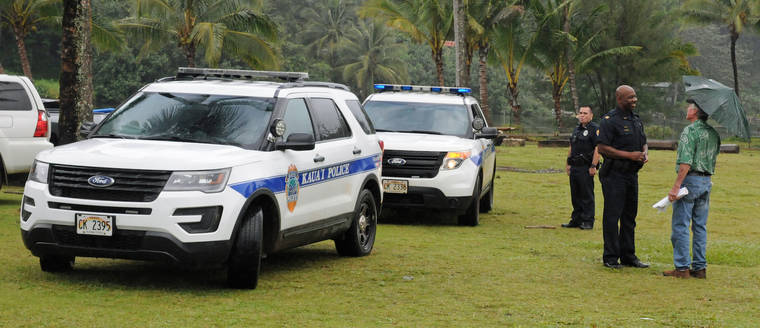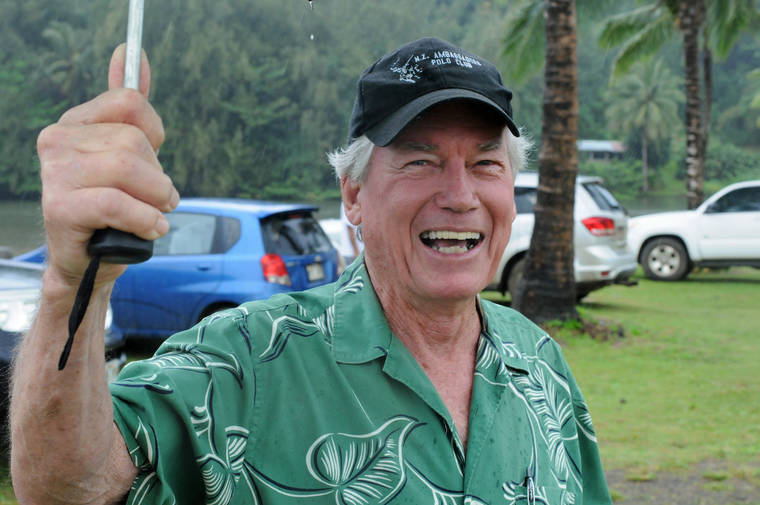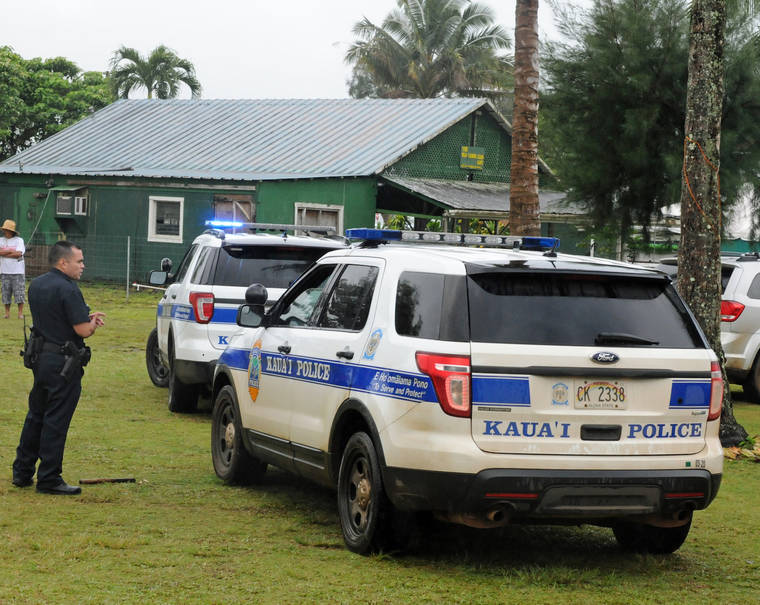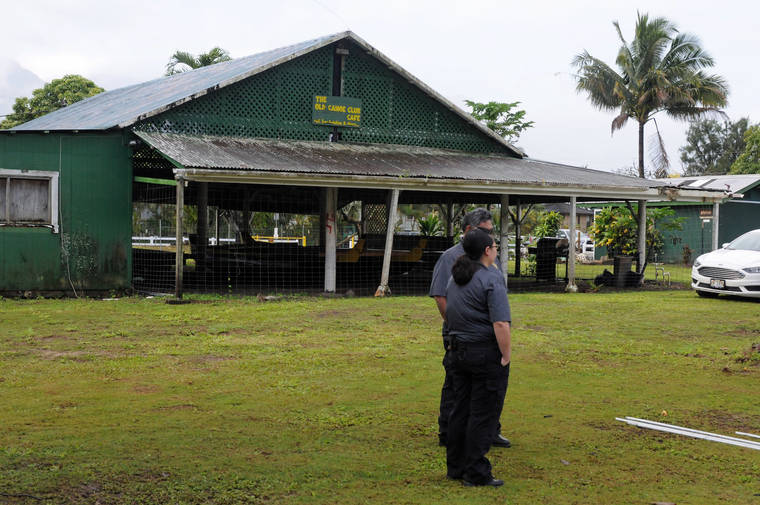Hanalei land dispute resurfaces





HANALEI — Rain, cooler heads prevailing and the community relations skills of Kauai Police Department Capt. Rod Green averted a potential confrontation Saturday over access to the dilapidated former home of the Hanalei Canoe Club near Black Pot Beach Park.
Though the situation ended peacefully and there were no arrests, the controversy became the newest front to the decades-old dispute over ownership of much of the land at Black Pot, but with a new overlay — Native Hawaiian rights.
It came two days after Kauai County officials publicly took a harder line over who can even enter the former canoe club building and warned that the structure is a safety hazard and in imminent danger of collapse. Former landowner Michael Sheehan and Native Hawaiian advocates took a contrary view, saying that the structure is safe and suitable for use as a community outreach headquarters.
The building, along the Hanalei River, is part of a much-larger patchwork of parcels formerly owned by Sheehan that was the subject of several years of litigation after the county moved to take over the property by eminent domain. Sheehan’s position, he said Saturday, is that, while the county may own the land, he still owns the building and can continue to use it.
He said he plans to attempt to reopen the litigation — possibly in federal court as a civil rights case — and claimed that he has a 44-minute recording of a meeting that, he says, included a county official making him a financial offer for the property several years ago at a figure much higher than what the county ultimately paid.
It was not clear how such a recording would change the outcome of the ownership dispute, which was the subject of a 2014 court order confirming the county owns the property. There was also a letter the county sent last August to an organization Sheehan founded, the Hanalei River Heritage Foundation, directing it to completely vacate the structure, and that continued use “will be treated as trespass and addressed accordingly.”
The dispute came to a head Thursday when the county published a notice on social media taking note of a community work day that had been organized for Saturday by Kamealoha Hanohano-Smith, the foundation’s program administrator, and other members of the Native Hawaiian community. It said the work day “DOES NOT have the proper approvals” and that the building “is NOT SAFE FOR OCCUPANCY” and that the KPD is “aware this event is not lawful.”
On Saturday, Sheehan and Hanohano-Smith both said the county mishandled the situation. Hanohano-Smith said there had been a bitter series of communications over several months with the county “talking to us as a parent would talk to a child,” and said he had received offensive emails from county officials.
Sheehan said the county’s approach continued a pattern he said established that the county is controlled by “sneaky buggers” who handled the property condemnation process as if it was a bait-and-switch scheme in which the amount of money the county was prepared to pay was repeatedly changed.
Saturday afternoon, the county issued a new statement on the situation by Mayor Derek S.K. Kawakami, saying, “fortunately, through midday Saturday, no individuals attempted to come onto the condemned property.” But a county news release also said that Department of Parks &Recreation employees had discovered Saturday morning that “no trespassing” signs and security cameras that had had been installed at the site “were removed.” A KPD report was filed, it said.
The county statement said “the ownership of the property, which has been questioned many times, is very clear. Despite these legal documents, false claims of ownership and management of this property continue to be circulated throughout the community.”
The Garden Island spoke with four people with close awareness of the history of the canoe club building and the controversy that has unfolded over the land formerly owned by Sheehan. None of them would agree to be named, but all are known to be closely associated with the club. They said the Hanalei Canoe Club, which now occupies another structure along the Hanalei River, came into being originally in the 1970s as a group of surfers and paddlers.
Eventually, the club adopted a more formal structure, and has a board, bylaws and other formalized procedures. It is one of the most influential organizations in Hanalei. More than 30 years ago, the group built the clubhouse that is now the subject of the occupancy dispute. However, these four people said, the building became unserviceable after Hurricane Iniki in 1992 and was abandoned.
Over time, they said, the deteriorating building became a pawn in the ongoing dispute between the county and Sheehan over ownership of the land. Recently, they said, the building has emerged as a potential beachhead in the ongoing controversy over Native Hawaiian rights to control land.
The situation is related, all four said, to the ongoing controversy over the Thirty Meter Telescope project on Mauna Kea on Hawaii Island, the 2017 occupation by Native Hawaiians of the former Coco Palms Resort in Wailua and an incident that same year in which four people were arrested after they briefly occupied a small tract in Wainiha. There was also a large protest with dozens of arrests at the Sherwood Forest area of Waimanalo Bay Beach Park on Oahu in October of last year.
Green, a skilled, ranking officer who once was a deputy sheriff in Los Angeles County, spent much of Saturday morning quietly talking with Sheehan, Hanohano-Smith and several others. He encouraged them to renew their formal communications with the county and said he met on Friday with Kawakami and others in the administration and was convinced a core problem was “a lack of clear communication.”
That process and intermittent rain that fell — sometimes heavily — appeared to limit the number of people who showed up for the community work day to fewer than a dozen. Two police vehicles that parked at the site initially departed.
County Councilmember Felicia Cowden eventually joined the discussion and agreed that better and clearer communication by all parties would improve the situation.
It was not clear that the truce would be long-lasting. Hanohano-Smith said the ramshackle former canoe club building was essential to the foundation’s activities and affords a physical location for its work, which, he said, includes community outreach and youth education. A canoe apparently owned by people affiliated with the foundation is currently stored at the site.
The building was in plainly distressed condition, with several support posts leaning at bizarre angles and much of the facing of the building seemingly in serious disrepair. Sheehan, for his part, said the old canoe club was still serviceable and was not in danger of collapse or substantially structurally compromised.
Hanohano-Smith said the controversy was symptomatic of disregard for Native Hawaiian concerns. “To me, this (dispute) is kind of silly,” he said. “We’re here to love, not to hate.” He said the county had repeatedly failed to honor requirements for consultation with Native Hawaiians that are included in a section of the federal government’s National Historic Preservation Act.
•••
Allan Parachini, a Kilauea resident, is a journalist, furniture-maker and former public relations executive who writes periodically for The Garden Island.

How does a building that was built just 30 years ago have any protection as native Hawaiian land? Tear the damn thing down.
I don’t see the native Hawaiian nexus here. Where are rights in question? How is this anything like TMT and others?
So, for a recap, …when you don’t get your way, “like parents talking to children”, you effortlessly and effectively scream “Native Hawaiian Rights”.
The county owns the land, but the crumbling building, again on county property, is still somehow yours for access when you want it?? Um, like, the County doesn’t want a “child” getting hurt in the building and then suing for $4 million.
Finally, love the “similarities”….TMT???? Give me a break. Children….
I would be interested to know how much the County of Kauai paid Mr. Sheehan for the land in question – land that is essentially undeveloped and subject to flooding. Also, how big is that parcel?
Records make it look like this one, but the owner is still listed as Sheehan:
https://qpublic.schneidercorp.com/Application.aspx?AppID=986&LayerID=20101&PageTypeID=4&PageID=8744&Q=454120892&KeyValue=550010020000
Still waiting for the county attorney to show the ownership documents for Black Pot, that he gave the county the “go ahead” before this document of purchase ownership was still not ready to present to the council or audience who has a right to see, paperwork of this nature, similarly the Treaty of Annexation, which no court or other fake state leaders, judiciary or military CAN not present! It all is the biggest ruse in hawaiian history 127-war with america, the teachers of terrorism 500 years +, and who never ever “owned” a nanoinch of these islands! The third eye says we’re destined to be in the triangle of “Aloha will save the planet” or will it continue satanic?
WTH are you talking about??????